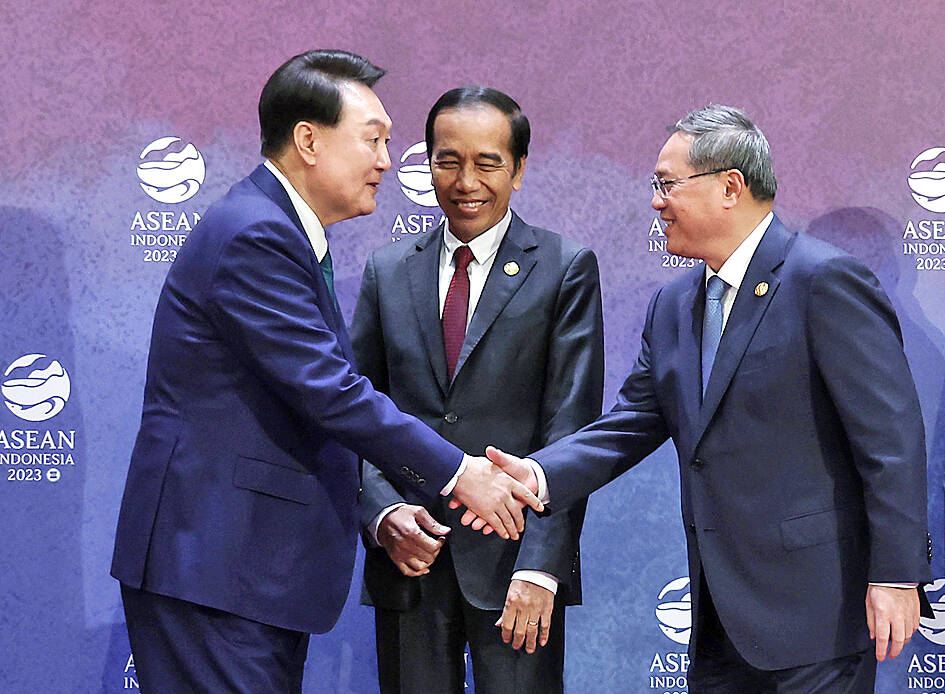China’s premier yesterday said that major powers must keep their differences under control and avoid “a new Cold War,” in a thinly veiled reference to Washington, as top Asian and US officials gathered for talks in Indonesia.
Beijing has expressed concern about US-backed blocs forming on its doorstep, while facing disputes with other powers in the region over the South China Sea and other issues.
“Disagreements and disputes may arise between countries due to misperceptions, diverging interests or external interferences,” Chinese Premier Li Qiang (李強) said at the start of an ASEAN Plus Three meeting with Japan and South Korea in Jakarta.

Photo: EPA-EFE
“To keep differences under control, what is essential now is to oppose picking sides, to oppose bloc confrontation and to oppose a new Cold War,” he said.
The 10-member ASEAN was holding separate summits with China, Japan, South Korea, the US and Canada, providing an arena for big powers to lobby the bloc and their rivalries to play out.
US Vice President Kamala Harris was attending in place of US President Joe Biden, while Li was taking part instead of Chinese President Xi Jinping (習近平).
Yesterday’s meetings precede an 18-member East Asia Summit today to be attended by Russian Minister of Foreign Affairs Sergei Lavrov and the G20 summit in New Delhi at the weekend, where broader geopolitical issues are expected to top the agenda.
Harris met ASEAN leaders, praising them for their “shared commitment to international rules and norms ... and regional issues.”
In a sign of Washington’s increasing regional engagement, she announced the creation of the first US-ASEAN center in Washington.
Japanese Prime Minister Fumio Kishida and South Korean President Yoon Suk-yeol are attending both days of meetings.
Yoon reportedly told ASEAN leaders there must be no cooperation with North Korea, which the US said this week is holding arms talks with Russia.
“Any attempts to forge military cooperation with North Korea ... should be immediately stopped,” Yoon was quoted by a presidential official as telling an ASEAN meeting, Yonhap news agency said.
Kishida and Yoon met Li alongside ASEAN leaders, with a row between China and Japan over the release of treated wastewater from the damaged Fukushima Dai-ichi nuclear plant one of the topics raised.
“Japan and China talked about Fukushima, but it wasn’t heated,” a Southeast Asian diplomat who was in the room said.

NATIONAL SECURITY THREAT: An official said that Guan Guan’s comments had gone beyond the threshold of free speech, as she advocated for the destruction of the ROC China-born media influencer Guan Guan’s (關關) residency permit has been revoked for repeatedly posting pro-China content that threatens national security, the National Immigration Agency said yesterday. Guan Guan has said many controversial things in her videos posted to Douyin (抖音), including “the red flag will soon be painted all over Taiwan” and “Taiwan is an inseparable part of China,” while expressing hope for expedited “reunification.” The agency received multiple reports alleging that Guan Guan had advocated for armed reunification last year. After investigating, the agency last month issued a notice requiring her to appear and account for her actions. Guan Guan appeared as required,

A strong cold air mass is expected to arrive tonight, bringing a change in weather and a drop in temperature, the Central Weather Administration (CWA) said. The coldest time would be early on Thursday morning, with temperatures in some areas dipping as low as 8°C, it said. Daytime highs yesterday were 22°C to 24°C in northern and eastern Taiwan, and about 25°C to 28°C in the central and southern regions, it said. However, nighttime lows would dip to about 15°C to 16°C in central and northern Taiwan as well as the northeast, and 17°C to 19°C elsewhere, it said. Tropical Storm Nokaen, currently

‘NATO-PLUS’: ‘Our strategic partners in the Indo-Pacific are facing increasing aggression by the Chinese Communist Party,’ US Representative Rob Wittman said The US House of Representatives on Monday released its version of the Consolidated Appropriations Act, which includes US$1.15 billion to support security cooperation with Taiwan. The omnibus act, covering US$1.2 trillion of spending, allocates US$1 billion for the Taiwan Security Cooperation Initiative, as well as US$150 million for the replacement of defense articles and reimbursement of defense services provided to Taiwan. The fund allocations were based on the US National Defense Authorization Act for fiscal 2026 that was passed by the US Congress last month and authorized up to US$1 billion to the US Defense Security Cooperation Agency in support of the

PAPERS, PLEASE: The gang exploited the high value of the passports, selling them at inflated prices to Chinese buyers, who would treat them as ‘invisibility cloaks’ The Yilan District Court has handed four members of a syndicate prison terms ranging from one year and two months to two years and two months for their involvement in a scheme to purchase Taiwanese passports and resell them abroad at a massive markup. A Chinese human smuggling syndicate purchased Taiwanese passports through local criminal networks, exploiting the passports’ visa-free travel privileges to turn a profit of more than 20 times the original price, the court said. Such criminal organizations enable people to impersonate Taiwanese when entering and exiting Taiwan and other countries, undermining social order and the credibility of the nation’s